It’s not uncommon for homeowners to hear creaks coming from certain areas of their homes. Depending on the cause, creaks may be heard coming from floors, ceilings, walls, appliances, and other areas.
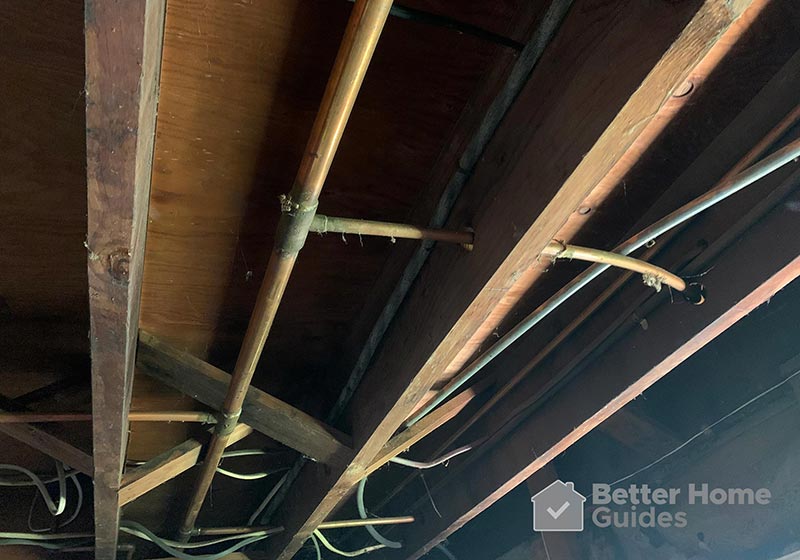
Many homeowners worry that the sounds and creaks might be a symptom of a larger problem, while other homeowners simply find the sounds to be annoying. In the rest of this article, we’re going to look at some of the most common causes of creaks, discuss whether or not you should be worried about them, and how they can possibly be fixed.
The most common causes of creaks in a home include temperature fluctuations causing expansion and contraction of home materials, loose floorboards, home settling, loose hinges, unfastened gutters, and other reasons covered below.
While some causes are fixable, others just take some getting used to, especially if your home is made with adaptable materials like wood.
Causes of Creaks and Other Noises in a Home
Most people have a bad association with creaks, but oftentimes they are normal. When it comes to your house, whether it’s a good or bad thing depends on the reason it creaks, a few of which we’ve got below.
1. Temperature Changes and Moisture
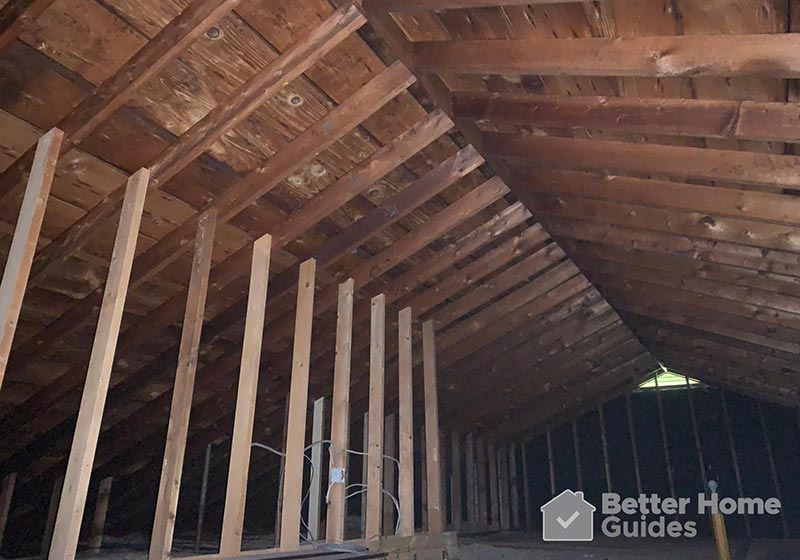
Temperature can have a great effect on materials and as things heat and cool, they also expand and contract. This is especially true for certain materials like wood and metal. In the summer months, when the weather is hot, these materials will expand. Throughout the day, as temperature changes, these materials will continue to expand and contract slightly, letting off small noises in the process.
The video above does a good job explaining why houses often creak at night or during significant temperature fluctuations.
2. Loose Floorboards
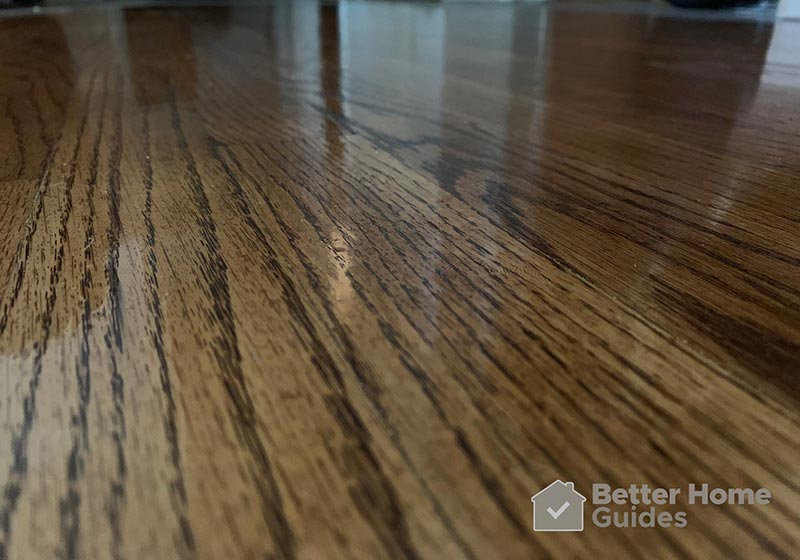
It’s very common to hear squeaking and creaking coming from floors. The natural wear of floors, on top of the normal expansion and contraction of wood and others materials, can cause creaking to become more noticeable as your home gets older.
The Fix: To fix a creaky floor, you’ll need to secure loose floorboards. You can either replace them altogether or you can fasten them with adhesive and screws inserted from below. Use screws that will penetrate the subfloor but stop below the surface of the finished floor. The video above does a great job explaining how to fix creaking in home floors.
3. Loose Hinges
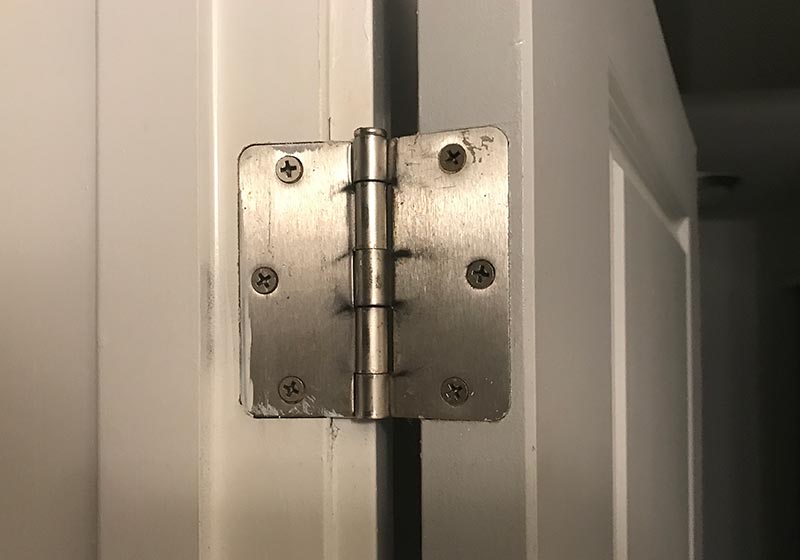
Creaking noises around the house could come from doors where hinges are loose. If you have doors that you open and close many times throughout the day, they may start to creak from overuse. Hinges will also start to sound if they are old, as they start to get worn out and don’t open, close, or work quietly like they used to.
The Fix: This one is pretty easy to fix because all you need is some lubricant. Unless your hinges are seriously rusty, you could just spritz a bit of lubricant and let it seep in. After that, the creaking noise will be over and done with, leaving you some peace and quiet in your home.
4. Home Settling
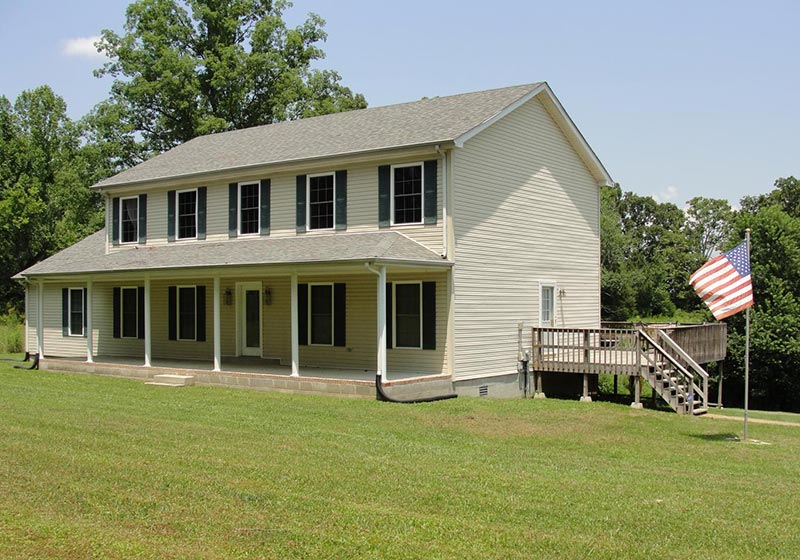
Setting refers to the natural process in which your home slightly shifts over time due to the shifting and compression of soil beneath the foundation. This process can cause a home to sink a number of inches after the first few years after a home is built, but as stated above, this is a natural process and normally nothing to worry about. These changes are subtle and don’t normally come with a lot of noise each and every day but, every once in a while, you’ll hear a creak or a pop from the movement. The most telling sign that settling is happening is the appearance of cracks here and there, especially close to the bottom of the walls where the floorboards meet.
5. Unfastened Gutters
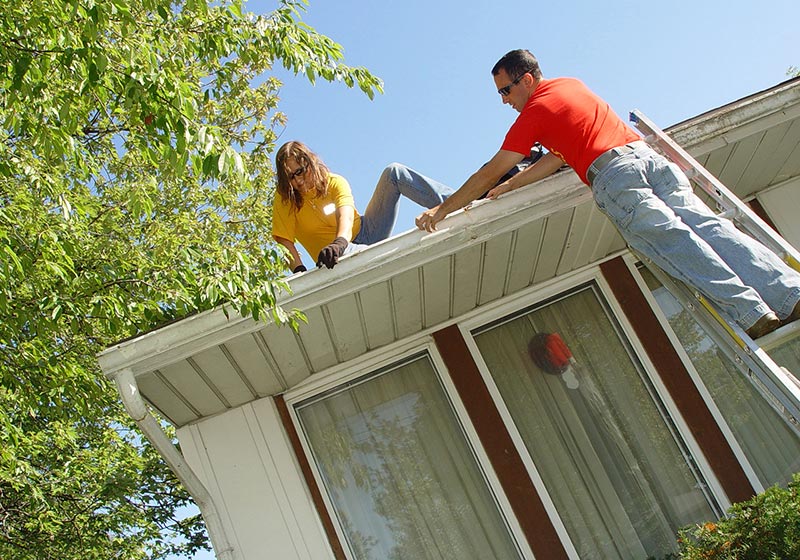
If you hear a very faint creaking noise that’s happening outside of your home, it could be coming from your gutters. If they are not fastened correctly, any bit of wind or a small critter crawling will make them creak. You may only notice when you have more severe weather or they may be loosened to the point that any little movement will make them creak. Either way, it can be annoying and something that you should take care of quickly.
The Fix: To fix creaky gutters, all you’ll have to do is tighten them up. The creaking might be due to loose bolts, which you can take care of by tightening them up. However, if there are other issues, you may need to either clean them or replace them if it’s been a while since you’ve given them some TLC.
6. Weather and Humidity
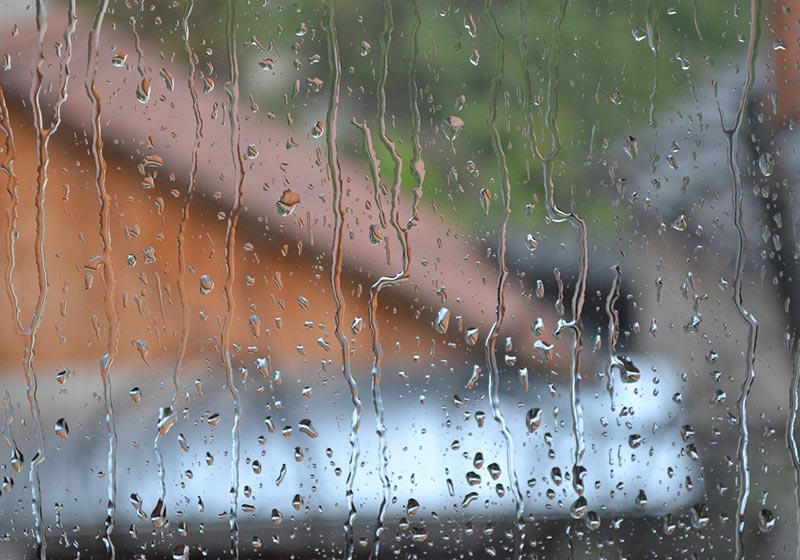
Weather, humidity, and moisture are also at times to blame for creaking. Like temperature, humidity and moisture can have an effect on certain materials, like wood, causing them to slightly expand or contract.
As far as weather is concerned, hot temperatures, high levels of moisture, and humidity can cause the soil around and under your home to change. The moisture makes it more malleable, which changes its position in relation to the foundation of the home.
If you’re experiencing more moisture in your area or are perhaps going through a dry spell, you could have noises coming from the ground and creeping up through the floors. The best thing you can do in these situations is to add moisture when it’s hot and making sure that your draining system is pumping water a safe distance from the foundation so that it doesn’t cause damage to your home further on down the road.
7. Pests Like Mice

No one likes to think that these little rodents are in their home but, they are much more common than we all think. They scurry around in all of the smallest spaces and can get in from virtually anywhere. When you hear creaking combined with scurrying or scratching, you could have mice running around your walls. Especially if you hear it while you’re trying to get some Z’s, mice are nocturnal and start to hunt and play while you’re asleep.
The Fix: If you have a small problem, you might be able to take care of the problem on your own. However, if it’s out of your control, you may have to call professionals in to take care of the issue.
8. Foundation Shifting
Another cause of house creaking can come from a home’s foundation. The foundation of the home is perhaps the most important part of the home. It is what holds everything together and must therefore be strong and sturdy. Over time, the foundation of a home can wear down and start to shift in the ground. If this happens evenly all around, there shouldn’t be an issue. However, if you have one side that sinks more than another, you could have an issue.
Some signs that you should check out your home for your uneven foundation include:
- Cracks in the flooring
- Stuck doors and windows
- Uneven floors or rooms
- Walls that bow in or out
If you notice any of these, you might want to get the foundation of your home checked out. If left to continually sink, over time, your home could be seriously unbalanced or even crack under the pressure. This issue is not just about the noise but about the overall health of your home.
Type of Foundation Cracks
Hairline Cracks
These are mostly found on brick homes, found in the mortar that lies between bricks. These cracks are normally small and don’t really create any cause for concern. Still, if you start seeing them pop up here, there, and everywhere, you might have an issue on your hands.
Stair-Step Cracks
Stair-step cracks are cracks that typically form at the base of the home. They look like start-steps (hence the name) and are usually some of the first signs that pop up when the level of moisture below the home starts to change. If you see really deep and wide cracks or see bulging around the crack, that’s a sign you should dig in deeper.
L-Shaped Cracks
L-shaped cracks typically show up when homes are sitting on an incline or are in an area where there are more hills around. These cracks take on the shape of an “L” and may be accompanied by other visible signs as well. These cracks are generally telling of shrinkage under the foundation. Luckily, these kinds of cracks can be filled pretty easily, so they’re not something you should fret about.
Horizontal Cracks
If you’re in a place where the weather is constantly changing, your foundation could be in more danger than you think. If this is your case, you should keep your eyes peeled for signs that you need to take a deeper look at your foundation. Horizontal cracks typically show up around the soil and are very large.
The depth comes from huge expansions during times when moisture levels are high followed by lots of dryness where the soil contracts and therefore cracks the foundation underneath. This type of crack is one that you don’t want to leave to fester and something that you should take care of ASAP.
Repairing your Foundation: What you Need to Know
If you have any concerning cracks around your home, you should get them evaluated before they start to cause a bigger problem. An expert should be able to let you know your options, helping you find a means of repair that works with your budget and the damages you have.
Foundation repairs will vary depending on the damage and the severity. Some could be a quick patch up and others could take a lot longer. Whatever the case, the foundation is not something that you want to leave alone so that you can prevent further damages from the home. When you think your home is showing signs of needing foundation replacement, consider:
- The type of repair needed
- Who will do the repairing?
- The cost
- Additional work is needed on top of foundation replacement
- Selling the home (if it seems far beyond repair)
In some cases, repairing your foundation can be a big job and something that your contractor will need to take seriously. It may be best to sell your home and look for something new if the repairs are too high and the work is too much.
Inspecting and Eliminating Creaking in your Home
There are some creaky noises that you can’t take care of. For instance, if your home is made with a lot of wood creaking is natural. However, if it has to do with a foundation issue, you might need to fix it sooner than later. One sure sign that your home’s foundation needs attention is visible cracks. If you have creaks in the home and also see any of the following kinds of cracks, you might need to check out your foundation.
The Walk-Around Inspection
The first thing you should do is take a walk around your home. Start on the outside and look for cracks, bulging, and bowing. If you see any of these, take a note of where they are and what you see. On the outside, it could be a sign that the soil under the foundation is shifting. While you’re out there, take a look at the ground surrounding your home and check for excess moisture.
Do the same on the inside, this time looking for cracks and bulging in the wall and ceiling. Again, note these places where you see cracks and try to identify them to know if you need to start thinking about replacement or if you can buy some time. Whatever the case, if you need replacement, you should call a professional first, getting their opinion before you go all out and spend much more than you have to.
Final Tip: Listen to your Home
If you have any more questions about why houses creak let us know below. Your home is a complex piece of property with a lot going on inside and outside. From all of the things that work together to provide you comfort to the very foundations, there’s a lot of room for things to go wrong. That’s why you should listen to your home and watch for signs that something isn’t quite right.
Listen for creaking and watch for cracks, as that could be a sign that you have some underlying issues that need your attention fast. If your home is creaking for other less serious issues, do what you can to fix them fast and get back to enjoying a nice quiet, and peaceful atmosphere. The more you listen to your home, the better idea you’ll have of what’s going on and what you can do to fix it.

Hello, my name is Chris and I was born and raised in Western Pennsylvania. I’m an engineer with experience in medical technology, steel and materials, and nuclear power industries. I have been with my current employer for more than 5 years developing digital control systems for nuclear power plants.
I’m also a homeowner with a growing range of home renovation experience. My goal is to take all my technical knowledge and first-hand experience and translate it into high-quality content to support all of your home guide needs. Whether it be step-by-step guides, technical consultation, or product reviews, my aim is to make all your home projects a great success!
